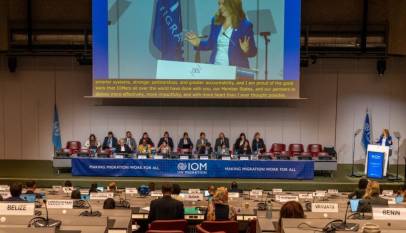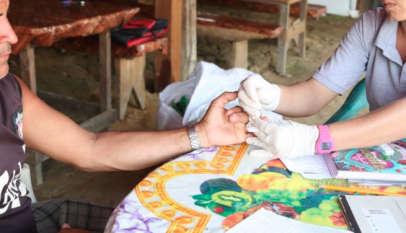Youth Action Guide on the SDGs

Ravi Karkara and Rohit Pothukuchiwe reflect on the recently launched Sustainable Development Goals (SDGs) and their relevance to youth
SDG 1: End poverty in all its forms everywhere
Young people can create awareness on goal 1 through traditional and progressive media, including social media. Young people can also write blogs, focusing on youth and poverty as well as youth in poverty. ONE is an “international campaigning and advocacy organization of more than 7 million people taking action to end extreme poverty and preventable disease, particularly in Africa… because the facts show extreme poverty has already been cut by 60% and can be virtually eliminated by 2030, but only if we act with urgency now”: http://www.one.org/us/. Blogs can be linked to WorldWeWant2030.org.
SDG 2: End Hunger Achieve Food Security and Improved nutrition and promote sustainable agriculture
Young people can get involved in their local communities by raising awareness about food security, participating in food drives, and helping support food programs at homeless shelters through volunteer activities. Students can access the resources of the World Food Program online. Yet another resource: the Super Food Drive specifically organizes food drives for youth.
SDG 3: Ensure healthy lives and promote well-being for all at all ages
Youth can start by learning more about health and sanitation, and taking precautionary measures to avoid the spread of disease, as well as teaching these precautionary measures in their communities. Youth can join the Rotary Club’s initiative to end Polio globally. Youth can further raise awareness about the health risks of smoking tobacco. Resource: The Red-Cross has numerous volunteer programs catering to youth, including leadership camps with a focus on health.
SDG 4: Ensure Inclusive and equitable quality education and promote learning opportunities for all
Students can encourage their peers to attend class and spread awareness on the importance of education in their community. Marginalized groups and groups that are likely to leave school or university should be encouraged to stay. The UN Girls Education Initiative (UNGEI) provides excellent resources on ensuring inclusive and equitable education. Teach for All, covers a wide range of countries and offers similar opportunities. Youth can also get involved with the Malala fund and reading the Brookings Foundation report on what works.
SDG 5: Achieve gender equality and empower all women and girls
Youth should join many of the advocacy campaigns in the gender equality and women’s empowerment space. Through its advocacy initiatives at the global, regional and national levels, the UNiTE campaign is working to mobilize individuals and communities. In addition to supporting the long standing efforts of women’s and civil society organizations, the campaign is actively engaging with men, young people, celebrities, artists, sports personalities, private sector and many more”. Students should read about and look for activities supporting UN Women’s “Planet 50-50 by 2030: Step It Up for Gender Equality campaign, which asks governments to make national commitments to address the challenges that are holding women and girls back from reaching their full potential”. Youth should also sign up for the HeForShe campaign to take a stand on gender equality and women’s rights. “Students can also partner the MAN UP campaign to support gender equality: .
SDG 6: Ensure available and sustainable management of water and sanitation for all
Young people can work with their local bodies to post signs next to water bodies, wells, and other water sources asking individuals not to pollute or waste water. Students can also implement rain harvesting at their homes and schools. Students can get involved with World Water Day on 22nd March or join the Sanitation for All campaign, collecting data and implementing action on sanitation: Get involved.
SDG 7: Ensure access to affordable, reliable, sustainable and modern energy for all
Young people can participate in setting up solar panels on their roofs and in their schools and universities. Students can make use of many programs offered by UNEP Tunza, specifically tailored for youth. Tunza regularly organizes youth related programs around the world. Youth can also take part in Earth Day and join the Earth Day Networks initiatives to plant trees globally.
SDG 8: Promote sustained, inclusive and sustainable economic growth, full and productive employment and decent work for all
Youth can organize job fairs and workshops to help their peers sharpen skills necessary to be more employable in the market. Youth can engage with the Global Initiative on Decent Jobs for Youth, launched at the EOSOC forum on February 1, 2016. Another key resource is the Knowledge Gateway on Women’s Economic Empowerment”. Students can join AIESEC and make use of their resources.
SDG 9: Build resilient infrastructure, promote inclusive and sustainable industrialization and foster innovation
Students can get involved with entrepreneurship incubators and platforms to push their ideas ahead. Youth should read through UNIDO’s Youth Entrepreneurship Curriculum Program. Yet another resource for young entrepreneurs is the G20 Young Entrepreneurs Alliance.
SDG 10: Reduce inequality within and among countries
Students can increase their exchange and dialogue with one another and foster peace and understanding. Students can collaborate on projects internationally that allow them to help build a sense of harmony between cultures. The YWCA has strong campaigns to end racism and inequalities. Youth should join the Indigenous Youth Caucus. Youth can also support equality in education for LGBTQ and marginalized youth by supporting the GRIN Campaign. Yet another initiative that is reducing inequalities with a focus on discrimination against disabilities is “World Enabled“. UN DESA also provides resources. Lions Club provides youth with the opportunity to understand other cultures and work towards reduced inequalities.
SDG 11: Make cities and human settlements inclusive, safe, resilient and sustainable
Youth can create a hotline for individuals to call during late night hours to ensure safety and a ready group of volunteers to respond in case of an emergency or contact officials. UN Habitat’s Youth division has numerous activities, publications, and programs that students can make use of. Youth can access more resources on preventing violence against women at the World Association of Girl Guides and Girl Scouts.
SDG 12: Ensure sustainable consumption and production patterns
Youth can start a compost project in their house or school to ensure that food does not go wasted. Youth can take up organic farming projects as well, attempting to reduce chemical usage in production and improve production and consumption patterns. An example from UNDP’s Youth Organic Farming in Samoa.
SDG 13: Take urgent action to combat climate change and its impacts
Youth can start by carpooling and measuring and reducing energy consumption in their homes and schools. They can also join campaigns. The UNFCCC Youth portal is an excellent resource. The YMCA “Camp Climate” seeks to ensure strong youth participation in climate related action, and is a great resource for youth. Verdentum is a non-profit social network that will allow students around the world to work on programs co-launched with UN bodies, governments, and international organizations to make an impact. You can register to be considered for Verdentum at www.verdentum.org and read more about it here.
SDG 14: Conserve and sustainably use the oceans, seas, and marine resources for sustainable development
Youth can petition to reduce over-fishing and pollution of water. The WWF provides material and has campaigns related to over-fishing. You can find an organization in your region working on water-related issues.
SDG 15: Protect, restore and promote sustainable use of terrestrial ecosystems, sustainably manage forests, combat desertification, and halt and reverse land degradation and halt biodiversity loss
Youth can organize local campaigns to reduce deforestation and can organize tree-plantations with indigenous varieties of plant life. Youth can join UNEP’s TUNZA Youth Network. The network is an excellent resource and method to collaborate with youth around the world on environmental sustainability issues. Youth can also participate in the Earth Day Network’s initiatives.
SDG 16: Promote peaceful and inclusive societies for sustainable development, provide access to justice for all and build effective, accountable and inclusive institutions at all levels
Students can organize legal clinics with local lawyers to help members of society that require legal aid, especially members of marginalized and under-served communities. Youth related organizations, schools, and universities can become members of the United Nations Academic Impact, individuals can access useful information, videos, and speeches. Another critical resource is the International Knowledge Network of Women in Politics (iKNOW Politics) is an online workspace. Youth can join the SCOUTS ‘Messengers of Youth’ project to promote peace. Adobe’s Project 1324 allows students to express themselves through creative means.
SDG 17: Partnerships for the Goals:
Students can participate in UN surveys such as MyWorld2030 and big data platforms such as www.worlwewant2030.org reach out to students and peers in their communities to participate. The Secretary General’s Envoy on Youth’s statics portal is an excellent database of youth-related information. Furthermore, you can now register your initiative and achieve the SDGs. Another excellent way for youth to get involved is to join some of Junior Chamber International’s projects around the world. The Millennium Campus Network is a useful tool for university students to collaborate. The SDSN is a network of scientists and technical experts in support of the SDGs.
Ravi Karkara is the Co-Chair of WorldWeWant 2030 and Senior Adviser to the Assistant Secretary General, UN Women (@ravikarkara)
Rohit Pothukuchi is the Founder & President of Verdentum, Policy Specialist to the UN Human Settlements Program, and Visiting Scholar at Columbia Law School (@rpothukuchi)
This article first appeared on Thomas Reuters Sustainability; it is republished with the permission of the authors















